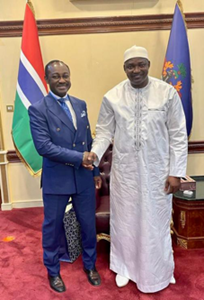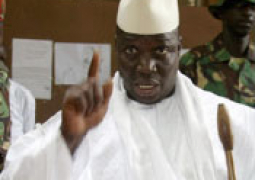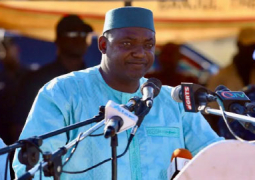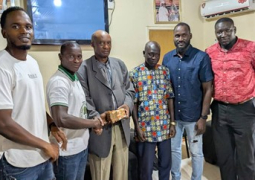
A high-level delegation from Shukran Capital Management, led by Executive Chairman and Gambia’s Goodwill Ambassador Modou Kabirr Faal, met with President Adama Barrow and Vice President Muhammad Jallow on June 3 to present the ground breaking waste-to-fuel project that promises to turn one of Gambia’s biggest environmental challenges into a powerful economic asset.
Dubbed the Waste-2-Fuel Project, the initiative aims to convert municipal waste including tyres, biomass, household and commercial refuse into clean automotive fuel, organic compost, and other valuable by-products. Notably, the project comes at zero cost to central, regional, or municipal authorities.
According to Executive Chairman Faal, the Project Executive, “this transformative project will require no payments from the central or municipal governments, no taxes, no fees, and no public surcharges. Instead, we will invigorate the national economy, while enabling municipalities to save 45 to 50% of their budgets presently spent on waste management.”
The project was initially considered for implementation in Kuwait and two major African economies, but Ambassador Faal successfully lobbied his international partners to launch it in The Gambia. Joining the delegation were Dr Qutaiba AlShaheen (Kuwait), Dr Issam Jaber (Belgium), and Mr Sven Luca Graebentiech (Germany).
Once operational, the Waste-2-Fuel project is expected to create more than 500 jobs in the first year alone, eventually expanding to 700. With a projected $1.2 million in employee compensation in the first year, the initiative offers real alternatives to youth unemployment and irregular migration.
In addition, by producing an estimated 36,500 metric tons of diesel-equivalent fuel annually, the project will offset nearly 26% of the country’s automotive gas oil imports saving an estimated $31 million in foreign exchange and stimulating local economic growth through reinvestment and industrial spillovers.
Unlike traditional waste-to-energy proposals that require excessive waste input for minimal energy output, the Waste-2-Fuel is tailored for Gambia’s urban landscape. Site assessments have shown there’s already enough accumulated waste in Banjul, Kanifing, and West Coast Region to sustain 10–15 years of operations.
This state-of-the-art technological process will leave virtually zero residual waste, offering an environmentally responsible alternative to landfilling and open burning; common practices that have contributed to air and water pollution, disease, and environmental degradation. As Mr Faal emphasised, “With our Waste-2-Fuel project, the dream of closing, and eventually reclaiming waste dumpsites such as Bakoteh and Tambana, will become reality.”
A major byproduct, organic compost, will support Gambia’s drive towards sustainable agriculture and reduce reliance on imported fertilizers. With over 51% of national waste classified as organic, this composting solution offers triple benefits for the environment, food security and the economy.
In a remarkable departure from traditional waste management schemes, current donkey-cart and truck waste collectors will no longer be charged dump fees. In fact, under the new system, they will be compensated for waste deliveries, while donkey-cart operators will be provided mechanised transportation, thereby creating significant economic incentives that empower informal workers and reduce animal abuse.
The project will also distribute around 37,000 garbage bins across communities and provide up to 90 modern waste collection trucks, ranging from automated vehicles to narrow-lane-compatible small trucks.
This initiative aligns with President Barrow’s call for meaningful foreign investment and sets the stage for The Gambia to become a regional leader in sustainable industrial innovation. Plans are already underway to scale the model across other ECOWAS countries.
In a rare and commendable gesture, Shukran Capital has committed to issuing equity shares or annual profit grants without requiring equity investment from the government. These public-benefit grants will be managed in partnership with the Gambia Investment and Export Promotion Agency (GIEPA) to further development goals. This rationale behind such approach was amplified by Mr Faal, thus: “The success of this national project will be built on the foundation of private and public collaboration. Additionally, we subscribe to the business concept of ‘Doing Well while Doing Good’. As such, we plan to share our successes with the public.”
Ambassador Faal brings decades of international experience in management, finance, performance excellence and transformation, among other disciplines. With senior advisory roles across Kuwait’s oil, energy, and scientific sectors as well as past leadership in U.S. energy and water utilities, municipal government, and consulting, he is uniquely positioned to deliver on this ambitious venture.
From job creation and import substitution to environmental restoration and agricultural enhancement, the Waste-2-Fuel project represents a comprehensive solution to multiple national challenges.
Shukran Capital Management has called on government institutions and communities alike to lend their continued support as the project moves into its approval and implementation phases.
Read Other Articles In Headlines

Jammeh backed witch hunt claims more than 40 lives, devastates others
Feb 8, 2022, 11:17 AM

Barrow says his administration has delivered promise of Gambianising Judiciary
Jun 7, 2022, 11:09 AM



